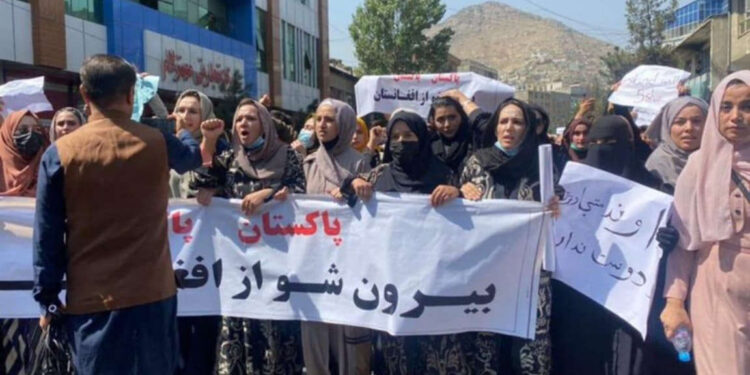The Taliban today fired shots into the air to disperse crowds who had gathered for an anti-Pakistan rally in the capital, the latest protest since the hardline Islamist movement swept to power last month. The Islamists have yet to announce a government, but Afghans — fearful of a repeat of the group’s previous brutal reign between 1996 and 2001 — have staged small, isolated demonstrations in cities including the capital Kabul, Herat and Mazar-i-Sharif. On Tuesday at least 70 people, mostly women, rallied outside the Pakistani embassy, holding banners and chanting against what they said was meddling by Islamabad, who have long been accused of having close ties to the Taliban movement. Pakistan’s intelligence chief Faiz Hameed was in Kabul at the weekend, reportedly to be briefed by his country’s ambassador but is likely to have also met with Taliban officials.
The previous day, a small group of women in the northern city of Mazar-i-Sharif gathered in a protest for their rights. Defiant women also came together in Herat last week demanding they be allowed to participate in the new government. Tuesday’s demonstration comes after the Taliban claimed total control over Afghanistan a day earlier, saying they had won the key battle for the Panjshir Valley, the last holdout of resistance against their rule.
Fahim Dashti, a well-known journalist and spokesperson for the Resistance Front, was killed during a clash in Panjshir province late on Monday, according to local TOLO News. The report quoted the National Resistance Front officials as saying that he was targeted by Pakistan Air Force drones in Anaba district of the province — a claim rejected by the Taliban. Fahim Dashti held various jobs over his career including media adviser, a member of the Afghanistan Journalist Federation, managing director of Subh-e-Kabul weekly magazine, and as head of the Afghanistan National Journalists Union, TOLO News stated.
The Taliban on Monday claimed total control over Afghanistan, saying they had won the key battle for the Panjshir Valley, the last remaining holdout of resistance against their rule. Following their lightning-fast victory in mid-August over the former Afghan government’s security forces and the withdrawal of US troops after 20 years of war, the Taliban turned to fighting the forces defending the mountainous Panjshir Valley.
As the Islamist hardliners claimed victory, their chief spokesman warned against any further attempts to rise up against their rule while urging former members of the security forces to join their regime’s ranks. “With this victory, our country is completely taken out of the quagmire of war,” chief spokesman Zabihullah Mujahid said. “Anyone who tries to start an insurgency will be hit hard. We will not allow another,” he later added at a press conference in Kabul.
The Taliban published a video of their flag being raised over the governor’s house in Panjshir — underscoring a historic win that has seen the anti-Taliban bastion defeated for the first time during 40 years of conflict. It remained in the hands of resistance fighters during Soviet rule, a subsequent civil war and the Taliban’s first regime of the late 1990s.
The National Resistance Front (NRF) in Panjshir — made up of anti-Taliban militia and former Afghan security forces — on Sunday acknowledged suffering major battlefield losses and called for a ceasefire. But on Monday the group said in a tweet that its fighters were still present in “strategic positions” in the valley.
The NRF includes local fighters loyal to Ahmad Massoud — the son of the famous anti-Soviet and anti-Taliban commander Ahmad Shah Massoud — as well as remnants of the Afghan military that retreated to the Panjshir Valley.
As Taliban fighters amassed in the valley, Massoud on Monday called on Afghans in and out of the country to “rise up in resistance”.
Taliban Government
The Taliban are yet to finalise their new regime after rolling into the capital Kabul three weeks ago at a speed that analysts say likely surprised even the militants themselves.
As they undertake a mammoth transition into overseeing key institutions and cities of hundreds of thousands of people, Mujahid said an interim government would first be announced, allowing for later changes.
“Final decisions have been taken, we are now working on the technical issues,” he said at a press conference.
Afghanistan’s new rulers have pledged to be more “inclusive” than during their first stint in power, with a government that represents Afghanistan’s complex ethnic makeup — though women are unlikely to be included at the top levels.
Women’s freedoms in Afghanistan were sharply curtailed under the Taliban’s 1996-2001 rule. This time, women will be allowed to attend university as long as classes are segregated by sex or at least divided by a curtain, the Taliban’s education authority said in a lengthy document issued on Sunday.
But female students must wear an abaya (robe) and niqab (face-veil), as opposed to the even more conservative burqa mandatory under the previous Taliban regime.
However, some universities in Kabul remained closed on Monday and those that did open saw a drastic fall in the number of students — some who complied with the new rules, and others who resisted.
Afghans are also facing a host of other challenges, including looming financial and humanitarian crises, although the Taliban on Sunday pledged to guarantee the safety of humanitarian workers and aid access in a meeting with the UN humanitarian chief.
Flurry of Diplomacy
The international community is coming to terms with the new Taliban regime with a flurry of diplomacy. US Secretary of State Antony Blinken arrived Monday in Qatar, a key player in the Afghan saga.
Qatar, which hosts a major US military base, has been the gateway for 55,000 people airlifted out of Afghanistan, nearly half the total evacuated by US-led forces after the Taliban takeover.
Shortly before Blinken’s landing, an official disclosed that four Americans had left Afghanistan by land to an undisclosed neighbouring country with Taliban knowledge, in the first departures arranged by Washington since its chaotic military pullout.
Blinken will also speak to the Qataris about efforts alongside Turkey to reopen Kabul’s airport, which is necessary for flying in humanitarian aid and evacuating remaining Afghans.
Blinken will then head Wednesday to the US air base in Ramstein, Germany, a temporary home for thousands of Afghans moving to the United States, from which he will hold a virtual 20-nation ministerial meeting on the crisis alongside German Foreign Minister Heiko Maas.
UK Prime Minister Boris Johnson on Monday pledged to “do everything we can to ensure” safe passage out of Afghanistan for over 300 Afghans eligible for relocation for their work with British forces but who were left behind in the evacuation efforts.











